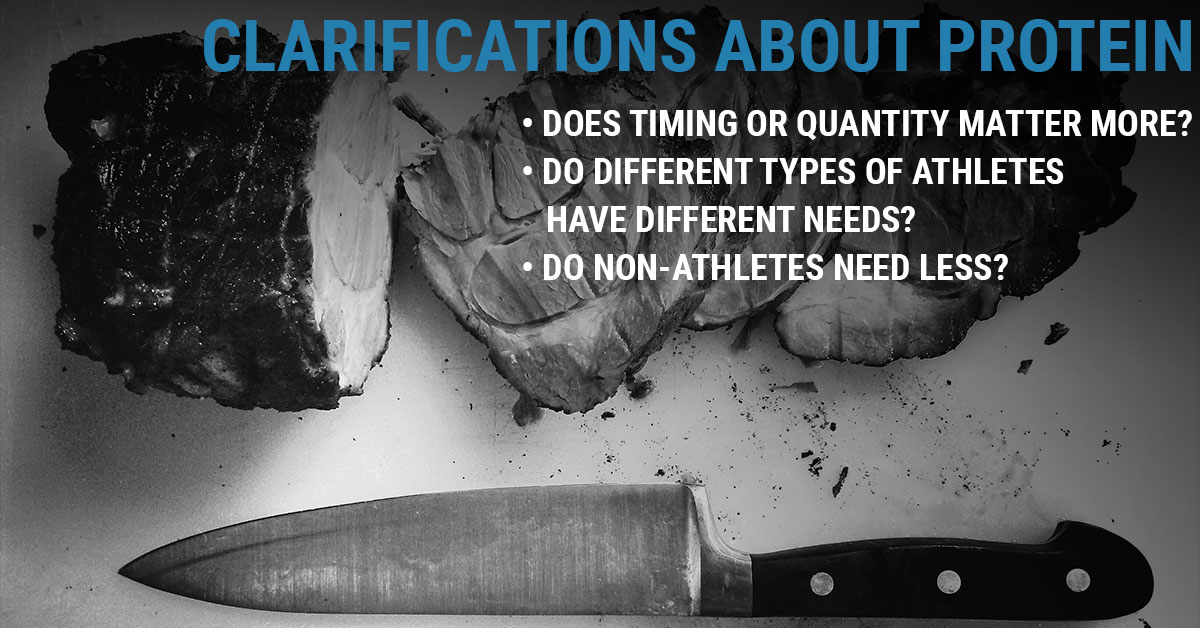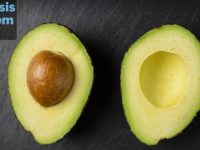Protein is the hardest macronutrient to understand, and questions routinely crop up surrounding it and its intake. I’ve tried to answer every big question in my protein series (which is a great place to start if you’re clueless about how protein works!), but there are still some aspects that I routinely get queried about.
If you’ve read through the protein series, then you’ll be well-equipped to understand the following clarifications. Otherwise, I recommend starting there and returning to this article after you’ve finished.
Does Timing or Total Quantity Matter More?
I recommend consuming roughly 20-30 grams of protein every 3 hours, and ideally getting 5-6 of these “meals” everyday—at least if your goal is muscle growth, recovery, or the prevention of muscle loss due to caloric restriction (e.g., dieting). Other people say timing your protein doesn’t matter, and all that really matters is total intake.
In a basic way, we can easily understand that both are important—eating a giant, 240 gram protein meal once every couple days is probably not effective as eating three smaller, 40 gram protein meals every day—but where does the line get drawn? Which is more important: timing or quantity? Let’s break the question down to its roots.
Firstly, you definitely need a certain quantity; protein is a limited ingredient, and our body can only use as much as we supply it. If you don’t supply enough, then muscle growth and repair is compromised. So getting enough protein is important, and in the case of athletes “enough” means about 100-160 grams per day. You could easily get this in two meals if you eat meat—or even one, if you’re determined—and our body will store some of the excess within the walls of our intestines to use for later. Basically, without enough protein, timing is irrelevant.
Provided you do get enough protein though, then timing matters. Studies such as this one show clear differences in muscle protein synthesis when different timing protocols are observed. Other studies show that the return on investment when large amounts of protein are consumed are lower than when smaller amounts are consumed, even across the day. So even if timing is of lesser overall importance than simply getting the right amount of protein, you can still affect your results depending on the dietary strategy you adhere to.
What about studies that apparently show that timing doesn’t matter at all, such as this one or this one?
First, they’re not done in a way that even remotely resembles an athlete training. Usually, they demonstrate that for the purposes of weight maintenance or weight loss, lean body mass is conserved equally well regardless of timing—but for an athlete, the goal isn’t just lean mass conservation, but lean mass recovery after exercise and muscle growth.
Second, the time periods these studies run for is extremely short, as in about two weeks. Some parameters will change rapidly during a two-week diet modification, but lean body mass is accrued and dissolved slowly—likely too slowly to discern a statistically significant difference in only two weeks.
Ultimately, this sort of question really misses the point of nutrient timing (and sports nutrition in general). The answer is pretty clear that timing is important, even if less so than just getting enough protein in the first place. It’s also more difficult to worry about timing, though, and people naturally want to take shortcuts. Unfortunately, shortcuts are just as ineffective at building strong bodies in sports nutrition as they are in training; you may get a portion of the results you’re after, but you’ll never achieve as much as you could if you put full effort in.
Do Different Types of Athletes Need Different Amounts of Protein?
When I talk about how much protein a climber should get each day, the retort I hear more often than any other is that “climbers aren’t bodybuilders”—and that somehow this means they don’t really need as much protein as I recommend. This is bunk and betrays a poor understanding of how protein works in the first place.
Protein isn’t like dietary carbohydrates or fat. With carbohydrates and fat, the amount you absorb is the amount you use, either through immediate oxidation for energy or storage for later. You don’t build complex structures with either nutrient; you only burn them for energy. As such, we can view them through the relatively simple lens of “energy in, energy out”.
With protein, however, it’s not about “energy in, energy out”—it’s about signalling. There is a tight physiological range where protein (or more specifically, plasma amino acids) signal most loudly for muscle protein synthesis, and this range is the same regardless of your weight, your sex, or the type of exercise you engage in; it’s hard-wired into our physiology. Consume less protein, and the signal comes through less strong. Consume more protein, and the signal plateaus.
Now, a valid objection could be that since bodybuilders are physically larger, they also have a greater total blood volume, and that it would take comparatively more protein to increase plasma amino acids to the requisite level—but there are a couple reasons why this might not be true or important.
The first reason is that protein absorption, as far as we can tell, is the same regardless of your height or weight. Faster and slower absorbing proteins both produce relatively equal levels of plasma amino acid spikes, with the main difference being the total magnitude vs. the overall duration. Both also produce the same degree of muscle protein synthesis, though there may be some debate about the relative virtues of slower, lower spikes vs. faster, higher spikes.
The key thing here, though, is that the 20 gram figure doesn’t necessarily reflect the time at which amino acids spike highest, but rather the time at which muscle protein synthesis is maximized; plasma amino acid levels may (and likely will) increase further, particularly since they can no longer enter the muscle once it’s full. For a larger-than-normal human, like a bodybuilder, it may take longer to reach that point (because more protein must be absorbed before plasma amino acid levels are at the proper threshold), and fewer amino acids may be wasted (because plasma amino acids spike for less time), but this doesn’t imply that more total protein is necessary to achieve the same result—only that we might expect the muscle protein synthesis curve to be shaped slightly different.
The second reason is that no study has so far noticed a major effect of weight on dietary protein and muscle protein synthesis. This study used subjects who weighed an average of 80 kg, but there was also a standard deviation of 15 kg (meaning that 68% of the subjects weighed between 65 and 95 kg, or 143 and 202 lbs). If weight affected the total amount of protein needed to maximize muscle protein synthesis, we would expect the results of studies such as the one above to show this, even if indirectly such as through a failed hypothesis. Instead, we see that 20 g was maximally efficient regardless of weight.
It’s also important to keep in mind that no studies on protein kinetics—what we’re talking about right now—have used professional bodybuilders as their subjects (at least not that I’m aware). Instead, they all use (typically male) subjects who weigh around 145-175 lbs (65-80 kg). This is a pretty normal weight range for male climbers, which means that the 20 grams every few hours model I’ve proposed fits the physiology of the average climber. Even if climbers and bodybuilders had different protein requirements, it wouldn’t mean climbers require less protein than I suggest, it would mean that bodybuilders require more.
Anyway, I get it—climbers and bodybuilders, with two vastly different body shapes and sizes, seem like they should need two vastly different protein regimens. But they don’t. Their diets will be different in many other ways (notably caloric content), but protein is not one of them!
Do Athletes Need More Protein than Non-Athletes?
What defines an athlete? I have a pretty broad definition: if you engage in physical activity multiple times per week, then you can probably consider yourself an athlete. If you train (even minimally) for those activities, then you’re almost certainly an athlete. For the sake of clarification, let’s say that being an “athlete” means you devote at least 10 hours to exercise or training per week; your skill at those activities is irrelevant.
I usually refer to all of my readers as athletes because I assume that most of you are interested in climbing, and as a person interested in climbing you probably climb or train regularly. Honestly, I’d give the benefit of the doubt to anyone here due simply to interest in the sport, even if you don’t exercise 10 or more hours per week. But maybe you’re concerned that you don’t quite match up with the recommendations I make, and you want some clarification.
Most people assume that athletes need more protein than non-athletes to get the maximal benefit from exercise. It’s clear that non-athletes who are sedentary need less protein (because they’re not engaging in any muscle-building activities), and it’s easy to think that their protein requirements remain low even when they occasionally exercise. The opposite is actually true, however!
Athletes—anyone who exercises or trains regularly—improve their protein metabolism, making them more efficient at using protein. This means they require less protein to get the same benefit. Non-athletes, with normal protein metabolisms, thus require slightly more protein to get the same benefit (though it’s unlikely to be significantly more, and the same issues with absorption and plasma amino acid spiking apply).
Of course, those who only occasionally exercise probably aren’t as concerned with protein metabolism as those who exercise frequently—and certainly, if you don’t exercise routinely, you’re not really going to benefit from a higher-protein diet in the same way as an athlete would because you simply don’t provide the right stimulus to the muscles. But physiologically speaking, an infrequent exerciser needs more protein than an athlete to achieve the same ends.
Summing Up
Protein is complicated; it’s frequently misunderstood, and often taken to extremes. I’ve done my best here and elsewhere to clarify it, but misunderstandings will persist.
From this article, you should understand why…
- Protein timing is important for deriving maximum benefit, even if you still require a certain amount of total protein across a day.
- All athletes, regardless of weight or discipline, require the same amount of protein.
- Athletes don’t have greater protein needs than non-athletes.
If you have other questions I haven’t addressed, leave them in the comments!















Many thanks for your article!
Maybe this is a silly question but how should I count my climbing hours in order to see if I fit in the “athlete” category? Is belaying included? Or only climbing?
Very interesting. You may find this of interest http://www.nrcresearchpress.com/doi/pdf/10.1139/apnm-2015-0550
Well, belaying is obviously less energy-intense than climbing is, but I would still include it in the overall time. Since climbing is so high-intensity compared to other sports, it would be very difficult to make it to 10 hours per week of “on the wall” time—the same as it would be difficult to achieve 10 hours of sprinting time for a sprinter, or 10 hours of lifting when you remove the rest periods! So consider the whole of the time, because those rests are important to your overall climbing/training as well.
Thanks for the article! For older adults (aged 65+) in particular, there are a number of adverse health outcomes associated with low protein intake, a fact that is often glossed over by proponents of lower-protein diets. In fact, when you tally both the positive (such as the above) and negative (such as slightly higher risks of certain cancers in the 45-65 age range) impacts of a high-protein diet, the numbers are clearly in favor of a higher-protein diet—which isn’t to say there isn’t a place for lower-protein diets for some people, but rather that those who demonize protein are often focusing on a very small piece of the greater picture.
I’m wondering, does the TYPE of protein matter? Disregarding the effects of eating more vs less fatty foods in general, does it make a difference if my protein source is something more fat-laden, like sausage or bacon (mmmm), or if its leaner, like (most) fish? Or do different types of lean proten matter, IE steak vs chicken? Also, does it make a difference if my proteins are mostly plant-based or animal-based? (IE do I need to consume significantly more plant-based than animal-based proteins to get the same net intake?)
Type of protein does matter, but only insofar as “quality” is concerned. Higher-quality proteins are richer in essential amino acids—the ones our bodies cannot produce themselves; fattiness of a protein source doesn’t matter in this context. For more information on protein quality (and which proteins fall where in the spectrum), you can peruse this article:
The Best Sources of Protein
I find it pretty fascinating that plasma amino acid levels are what signals the muscles to use the protein. In my brain, the muscle cells (after being stressed/damaged) would be soaking up all of the AAs they could get their pumps on. But of course our bodies are so much more complicated than that… Thinking about it, I suppose it makes sense in light of the fact that proteins are essential to every single hum-drum function of our cells just to maintain basic homeostasis. So those needs should be met first before something as non-essential as increasing muscle mass. It does seem kind of weird, though, that a body builder would not actually require any higher protein intake to maintain the sheer amount of muscle mass that they have accumulated–I mean, like, a competitive body builder could easily have four times the muscle mass that I have. So it would just seem like they need way more total protein than the average athlete.
I agree that it certainly seems like a heavily muscled individual would need more protein, but I think the answer to the apparent dilemma is that a significant amount of protein is “wasted”. If you could use all 120 grams of protein every day, you could gain over a pound of muscle every week. Even if we assume that 50% of that protein goes towards cellular renewal and general repair, you’d still have the capacity to gain a pound of muscle each week. So, my best guess is that the more muscle you have, the more “use” you get out of a single dose of protein—but the physiological trigger point for maximizing the use of protein remains the same, even if more or less of it ultimately gets used.
Cool, yeah, that makes good sense all around, especially the concentration signal being universal. I just thought maybe they were able to utilize more protein beyond that 20 gram threshold. But the whole protein waste hypothesis makes senseverything, too.
Do we know where the receptors are that detect blood AA levels? In the brain, muscles, or?
They’re within the muscle cells themselves (and also in other cells, but since other cells don’t hypertrophize like muscle cells and may need different inputs as well to trigger, they’re not really relevant here!).